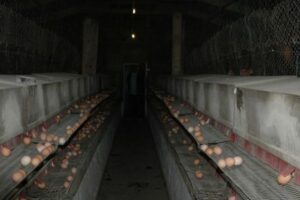McDonald’s To Buy 1 Million Cage-Free Eggs Per Month

In a recent announcement to its shareholders, McDonald’s revealed plans to begin purchasing 1 million cage-free eggs every month.
The decision comes after exhaustive battles with animal protection groups who have pressured the largest fast-food chain in the world to make a number of demands of their suppliers, including the treatment of egg-laying hens.
While one million eggs per month may sound like a lot, to understand how much food McDonald’s sells, you have to think big. Really, really big. The franchise has sold more than 100 billion Big Macs since opening its doors in 1940 and serves nearly 60 million people every day around the world (2.5 million per hour!). At that rate, they could feed a meal to every American in one week, and could run through a supply of cage-free eggs in a matter of minutes.
Don Thompson, McDonald’s President said at last week’s annual meeting, “Only 5% of eggs in the industry are cage-free,” and that even if the company made efforts to buy all the cage-free eggs, there simply would not be enough to meet the demand. So, the company announced that they will also begin buying another 1 million eggs per month from “enriched housing” habitats that claim to provide more space for each bird, which includes areas for perching and nesting.
According to PETA (People for the Ethical Treatment of Animals), one of the most active animal protection agencies working to establish new standards for McDonald’s suppliers, chickens are arguably the most abused animal on the planet. The U.S. kills more than 8 billion chickens every year and nearly 300 million are used for their eggs. A startling 99 percent of these animals spend their lives totally confined in cages, without access to natural light, and crammed so tightly together that these docile birds will often resort to cannibalism. The conditions are so unsanitary that antibiotics are given as routine, leading to the spread of antibiotic-resistant bacteria that threatens our health in a number of ways. And, unlike pigs or cows, there is not one federal law that protects chickens from abuse.
Keep in touch with Jill on Twitter @jillettinger
Photo: steve p2008

